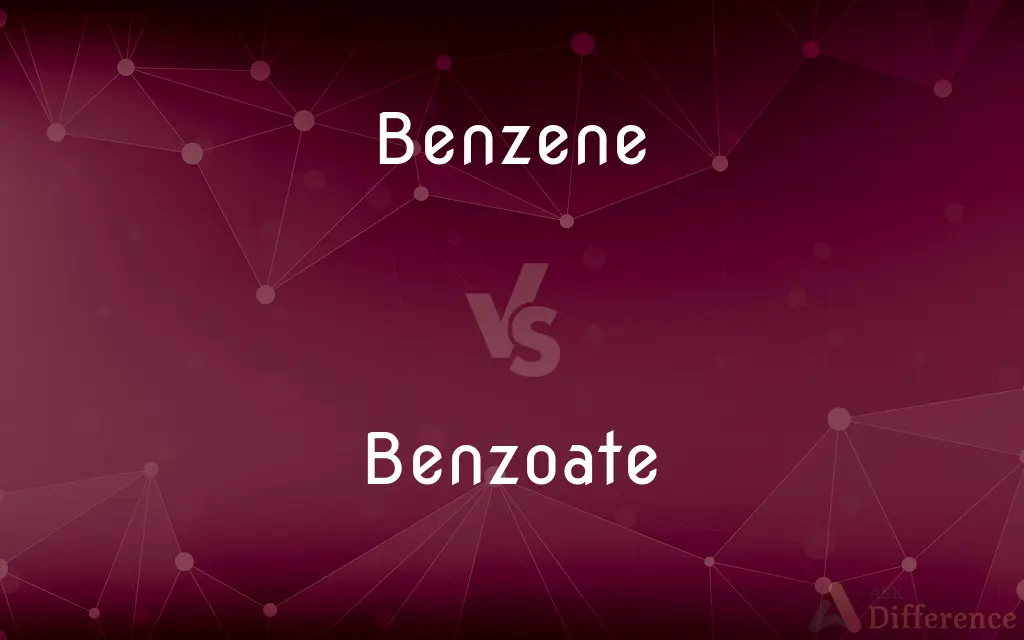Benzene vs. Benzoate — What's the Difference?
By Tayyaba Rehman — Published on October 25, 2023
Benzene is a volatile, aromatic hydrocarbon compound. Benzoate is a salt or ester of benzoic acid. Both are related but differ in their chemical structures and uses.

Difference Between Benzene and Benzoate
Table of Contents
ADVERTISEMENT
Key Differences
Benzene: Benzene is a simple aromatic ring compound, characterized by its circular six-carbon structure with alternating double bonds. It is a foundational component in organic chemistry, and its structure is often used as a base for various chemical derivatives. On the other hand, Benzoate does not share this simple ring structure but is related in its origin.
Benzoate: Originating from benzoic acid, Benzoate is the name given to the salt or ester forms of this acid. Benzoic acid itself can be produced by oxidizing toluene, which is a derivative of Benzene. So, while Benzene serves as a precursor in the production process, Benzoate is a downstream product.
Chemical Structure: When observing their molecular construction, Benzene is represented by the formula C6H6, showcasing its ringed carbon-hydrogen bonds. Benzoate, on the contrary, has a variable structure, depending on its specific form, but always contains the carboxylate group (-COO) from benzoic acid.
Applications: Benzene's properties make it a valuable solvent in the chemical industry, and it's also a precursor to many synthetic materials. Benzoate, however, is more commonly known for its use as a preservative in foods, owing to its antimicrobial properties.
Health Impacts: Both Benzene and Benzoate have implications for human health. Benzene is known to be carcinogenic and is strictly regulated. Benzoate salts, like sodium benzoate, are considered safe in small amounts but can cause allergic reactions in some individuals.
ADVERTISEMENT
Comparison Chart
Nature
Aromatic hydrocarbon
Salt or ester of benzoic acid
Chemical Structure
C6H6
Variable, but includes -COO group
Origin
Basic ring compound in organic chemistry
Derived from benzoic acid
Uses
Solvent, precursor to other chemicals
Food preservative, antimicrobial
Health Impact
Carcinogenic
Generally safe, but can cause allergies
Compare with Definitions
Benzene
An aromatic compound with a ringed structure.
Benzene's unique structure makes it fundamental in organic chemistry.
Benzoate
Used as a food preservative.
Benzoate helps extend the shelf life of many processed foods.
Benzene
A precursor to many chemical derivatives.
Benzene can be chemically altered to produce various compounds.
Benzoate
The salt or ester of benzoic acid.
Sodium benzoate is a common type of Benzoate used in foods.
Benzene
A colorless volatile liquid hydrocarbon.
Benzene is used as a solvent in many chemical reactions.
Benzoate
Known for its antimicrobial properties.
Benzoate can prevent the growth of harmful bacteria in products.
Benzene
Known for its sweet smell.
Despite its pleasant odor, Benzene is harmful when inhaled in large amounts.
Benzoate
Can be derived from Benzene.
Through a series of chemical reactions, Benzene can lead to the production of Benzoate.
Benzene
Classified as a carcinogen.
Prolonged exposure to Benzene can increase the risk of certain cancers.
Benzoate
Can cause allergic reactions in some people.
Some individuals might experience hives or asthma symptoms from Benzoate.
Benzene
A colorless, flammable, toxic, liquid aromatic hydrocarbon, C6H6, derived from petroleum and used in or to manufacture a wide variety of chemical products, including DDT, detergents, insecticides, and motor fuels. Also called benzol.
Benzoate
A salt, ester, or anion of benzoic acid.
Benzene
(organic compound) An aromatic hydrocarbon of formula C6H6 whose structure consists of a ring of alternate single and double bonds.
Benzoate
(organic chemistry) Any salt or ester of benzoic acid.
Benzene
Sometimes used in place of the phenyl group.
Benzoate
A salt formed by the union of benzoic acid with any salifiable base.
Benzene
A volatile, very inflammable liquid, C6H6, contained in the naphtha produced by the destructive distillation of coal, from which it is separated by fractional distillation. The name is sometimes applied also to the impure commercial product or benzole, and also, but rarely, to a similar mixed product of petroleum.
Benzoate
Any salt or ester of benzoic acid
Benzene
A colorless liquid hydrocarbon; highly inflammable; carcinogenic; the simplest of the aromatic compounds
Common Curiosities
Is Benzene harmful to humans?
Yes, Benzene is a known carcinogen and can be harmful if inhaled, ingested, or absorbed.
What is Benzene primarily used for?
Benzene is used as a solvent and precursor for various chemicals.
Why is Benzoate added to foods?
Benzoate acts as an antimicrobial, preventing spoilage and extending shelf life.
Are there any side effects associated with Benzoate consumption?
While generally safe in regulated amounts, some individuals can have allergic reactions to Benzoate.
How is Benzoate related to benzoic acid?
Benzoate is the salt or ester form of benzoic acid.
How is Benzoate typically utilized in foods?
Benzoate, especially in the form of sodium benzoate, is used as a food preservative.
Can Benzoate be naturally found in foods?
Yes, certain fruits like berries and apples can naturally contain Benzoate.
How is Benzene produced commercially?
Benzene is often derived from petrochemical sources through processes like catalytic reforming.
Can Benzene be found in cigarettes?
Yes, Benzene is one of the harmful chemicals present in cigarette smoke.
Is Benzoate used in cosmetics?
Yes, Benzoate, especially sodium benzoate, can be found in certain cosmetic products.
Is Benzene found in gasoline?
Yes, Benzene is a component of gasoline, contributing to its octane rating.
Why is Benzoate preferred as a preservative?
Due to its antimicrobial properties, Benzoate effectively prevents bacterial growth in products.
Are there alternatives to using Benzene in the chemical industry?
While Benzene is a key compound, researchers are exploring safer alternatives due to its carcinogenic properties.
What are the environmental concerns with Benzene?
Benzene is a pollutant and can contaminate air and groundwater, posing health risks.
Can Benzoate be synthesized from Benzene?
Yes, through a series of chemical reactions involving toluene oxidation, Benzene can lead to the production of Benzoate.
Share Your Discovery

Previous Comparison
Strategic Planning vs. Operational Planning
Next Comparison
Gerund vs. Verbal NounAuthor Spotlight
Written by
Tayyaba RehmanTayyaba Rehman is a distinguished writer, currently serving as a primary contributor to askdifference.com. As a researcher in semantics and etymology, Tayyaba's passion for the complexity of languages and their distinctions has found a perfect home on the platform. Tayyaba delves into the intricacies of language, distinguishing between commonly confused words and phrases, thereby providing clarity for readers worldwide.











































